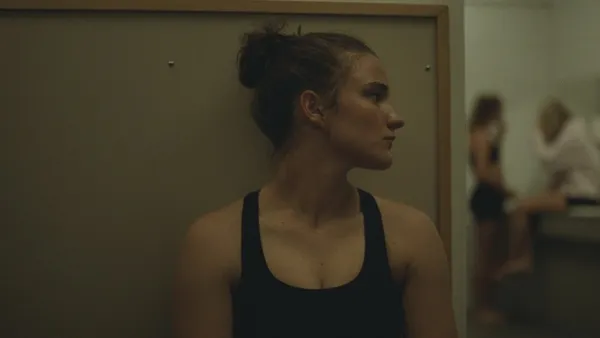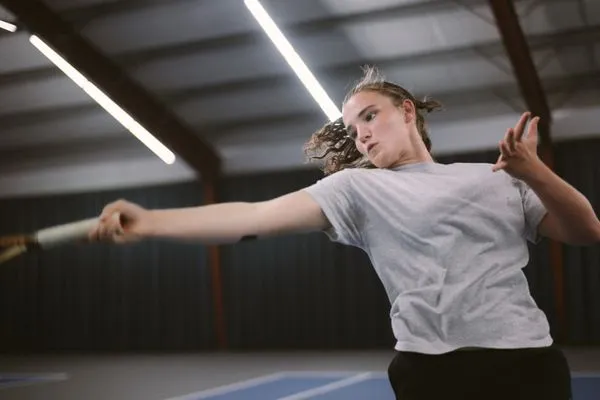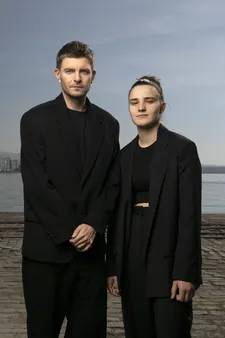Julie Keeps Quiet keeps its focus on a young tennis star after her coach is suspended following the suicide of a fellow player. Tessa Van den Broeck - who is herself an up-and-coming player - imbues Julie with a sense of stoicism as she maintains her silence despite the adults around her pushing her to speak out. Director Leonardo van Dijl - who co-wrote the script with Ruth Becquart, says it was important to keep the agency with his central character, even though his choice meant it was tough to get the film made.
“When I started the movie five years ago, the general consensus was, ‘It’s not a movie. She keeps quiet’,” he says. “It's almost like with every no I got, I knew that this was a story. The movie came from that desire to see the movie because there was not a movie like this. Before speaking out, there always will be silence and I wanted to talk about that. We all carry silence in us and we all come to points where you have to break it. It's part of the human condition in that way, whether that silence is about abuse or, for example, it’s your sexuality or just something about the family that you're growing up in - maybe your brother is an alcoholic. There are so many ways to sit in with it. So I felt that was important.”
Van Dijl’s choice has since been vindicated, with the film selected as Belgium’s submission for the foreign language Oscar. It has also been enjoying a strong festival run since it premiered in Cannes’ Critics’ Week, most recently playing at Thessaloniki and Leeds Film Festivals. When we caught up with van Dijl and Van den Broeck in Thessaloniki, the director said he was pleased that the film has become “a conversation starter”.
He added: “I'm very happy that it is released now because I feel now the silence can be heard. I think in those four or five years, I wanted to sit in with Julie and talk with her and listen to her and try to understand all the reasons why somebody keeps quiet and all the reasons why somebody might feel the pressure to speak out.”
The Belgian director says he picked the world of tennis because he is a fan. He also notes that her love of the sport is “why Julie keeps on going”.
He said: “I found it very important because we often see stories, especially about women, where they are always being punished. I did not want this to happen with this story. I wanted her to become a better tennis player. That was my contribution as a male director. I thought at least if I allow myself to talk about this life of a young girl then I need to retell that narrative in a way that it has a different outcome.”
Van Dijl says casting teenagers was vital to the film. “I wanted to work with tennis players and with teenagers because they also become sensitivity readers because they can say, ‘I would never do that’. It was important that she wouldn't be too much of an adult. I think you cannot ask somebody who is 20 to play 16.
“I spoke a lot with coaches. I talked a bit about the movie and I also talked about the intentions, I said, ‘I want to tell a story that is not only about bad coaching, but also about the good coaching. I want to tell the impact of a good coach on an athlete who becomes a better player, where she is allowed to have a voice if she's allowed to be silent and to be listened to - all the things her old coach was not doing’.”
Van den Broeck says she was surprised to find herself auditioning for the film after her coach sent her a link to the auditions.
She recalls: “First, I was like, ‘Why has he sent it to me because I'm just a tennis player?’ I showed it to my sisters and they were like, Oh you really have to do it. Just try it. They will not choose you. I want to see how it works’. Then I went to the auditions without any expectations and I liked it, it was fun. And I think I did okay, because otherwise I wouldn't be here now.”
Once the film was cast, van Dijl says they had a lot of rehearsal time, during which he shot on his iPhone and worked on rewriting the dialogue.
“Once we came to set, everybody knew exactly what we were going to do because we were also shooting on film so we didn't have much time. We shot it on film so restrictions were part of the process of making it. And, like a true athlete, I saw every challenge as an invitation to do something better.”
 |
| Leonardo van Dijl: 'We all carry silence in us and we all come to points where you have to break it' |
Speaking to Tessa, he adds: “You have this bizarre magic in you, you always know how to do everything and you can play a strong character and at the same time you expose why she's so fragile.”
He also says it was important to create the right environment on set and that included casting a supporting cast that included many of Tessa’s tennis friends, who she has known since childhood.
He said: “I thought it should be with the whole pack because then it’s a shared adventure, it can be like a fun summer camp. That is a massive intervention in the life of a teenager so for me it was important that her surroundings were there.
“At the first meeting I said to her parents, ‘She was a happy kid when she arrived at the casting and I want her to be a happy kid every day that she arrives on set, and this is going to be teamwork’.”
Van Dijl was named best director in Thessaloniki’s International Competition. He says he wants adults to sit up and take notice. “Sometimes people say, ‘This is such an important movie and children should see it, teenagers should see it’. And I'm like, ‘No. The grown-ups should see it’. I made it for the grown-ups. Isn't it up to our generation to start that narrative to make movies like this to write articles about it to Influence things in that way - from soft politics to real politics to change laws.
“Teenagers should deserve to be clueless. We need to create a safe environment for them to practise any kind of passion that they have. If we start talking about these things like safe sports and safe child practices and really investing in that care for children, then coming form that we will also find the means to create a safe world for adults. How we are educating our children is how we are educating victims.”
Making the film has also had a lasting effect on the director.
He says: “Writing about a girl who is 15 years old and how the world comes back and is treating her, I started to understand how the world has been treating me as a homosexual guy. So sitting with another perspective made me understand more the politics of my own identity.”
He adds: “Not everybody was rooting for the film. I made the movie from a personal space of I need to tell the story because I need to see it. I’m still enjoying the process of talking about Julie and advocating for her silence. It is a meaningful conversation to have and, hopefully, restorative. I guess that’s my aim, to continue telling stories that are difficult.”


























